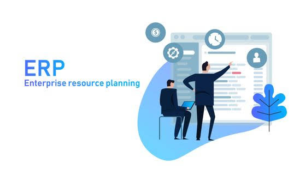The ERP project management module for your business can be a game changer. 95% of businesses report improvement in their business with the implementation and project management of ERP. Now it is time to move forward with your organization.
The process of installation and configuration of an ERP software system in a business refers to the ERP installation. ERP project management and auditing involve the integration of different business functions, operations, and finance into a single ERP system. ERP implementation and proper management and monitoring offer real-time data and reporting abilities that can improve the efficiency of an organization’s processes.
Proper management and auditing of ERP for your business can be very beneficial. This article will guide you through ERP project management and monitoring.
What is ERP Project Management?
ERP project management is a systematic technique to track and manage the adoption of ERP technologies within a business. ERP deployment requires a set timetable and budget.
ERP project management and modules serve as a centralized platform for integrating various company operations. These functions cover financial performance management, risk assessment, supply chain operations, and project management.

Tips for Ongoing ERP System Maintenance Updates and Optimization
- Regular health checks
- Periodic reviews
- User training
- Vendor support
- Change management
- Performance monitoring
- Data cleanup
- Data security
- Continuous improvement
A Comprehensive Guide to ERP Management and Auditing
ERP management and monitoring improve by ERP consultant which is definietly improves the efficiency and provide useful insight. The steps given below will guide you in the management and auditing of ERP.
-
Assess Current Systems
Assessing your current system and identifying areas that need improvement is the first step in ERP management and monitoring. This step of the ERP project management plan shows how to improve your current business state. It will help you understand your business operations and if some problems or inefficiencies need to be addressed immediately.
This step will help to improve and pay attention to different areas, such as:
- Financial systems
- Information technology (IT) infrastructure, software, and hardware
- All business processes, automation, and workflow
- Sales and marketing systems, including CRM
- Manufacturing and production processes
- Data management and reporting
- User experience
-
Set the Scope and Goals
After you assess the current state of your system, the next step in the ERP project management methodology is to set its scope and goals for your business.
This step will help you decide the tasks to be managed by the ERP system, the business objectives that the ERP system needs to support, and the data integration.
The considerations you need to make to set up the scope of your ERP project management are:
- What are the specific data requirements, involving data migration and integration, for the system?
- Which functions and business procedures will the ERP system automate?
- What are the requirements and needs of the new stakeholders?
You can determine the success of your business by knowing the goals and scope of the ERP project management module.
3. Choose an ERP System
In this step, the evaluation and research of different ERP software options will help you determine which option goes best with your business objectives and requirements.
Before choosing the ERP solution, consider:
- Is the software flexible and scalable enough to accommodate the future growth of the business?
- Does the software meet the requirements of your business, such as CRM and accounting?
- What is the total cost of ownership, which involves customization, implementation, maintenance, and support of the ERP system?
4. Configure Your ERP System
In this step, you need to optimize the system in accordance with business procedures and workflow.
Following are the steps to configure your ERP system:
- Customize the software.
- Set up the organizational structure
- Define user access control.
- Integrate with other systems

5. Prepare and Migrate Data
Data migration can be a crucial and time-consuming process, so it is difficult to prepare and plan data. It includes:
- Clean and validate the data for accuracy.
- Defining a data transfer methodology
- Develop data governance policies and protocols.
- Testing the migration process for data
- Establishing the data recovery and backup plan
By efficiently managing data migration and preparation, you are successful in ERP project management and auditing.
6. Test the ERP System
After following all these steps of implementation and management of ERP, you need to test the ERP system to troubleshoot issues.
To test the ERP system, it is essential to:
- Test system security
- Perform end-to-end system tests for functionality.
- Conduct user accessibility reviews.
- Validate all migrated data for accuracy.
- Identify and document user acceptance criteria.
7. Experienced Employees for ERP project management
For the management of an ERP system carefully, you must hire experienced staff. You need to properly train your staff to manage your ERP system. You need to train your employees using an ERP system. When you are training your employees, provide:
- Overview of the ERP system
- Clear all the functions and features of your ERP system.
- Details about data entry and reporting
- Guideline to solve issues
By following all these steps mentioned above, you can successfully manage and monitor your ERP system to improve your business.
Bottom Line
An ERP system can help you optimize all business operations and gain a lot of profit. ERP project management and monitoring are critical but can be efficiently done by following the given steps. It will help you troubleshoot all the organizational issues and provide valuable business insight.




